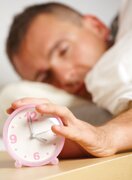
Just can’t get enough sleep? Uh oh.
The required amount of sleep slides from 18 or 20 hours for infants to about six hours for older adults. The sleep of middle-aged people (age 40-60) tends to be shorter, shallower, and more fragmented than that of younger adults. Generally for adults, seven to nine hours of sleep is ideal, but only about one quarter of adults get eight or more hours of sleep daily. Sleep timing is controlled by the circadian clock, sleep-wake homeostasis, and sometimes by willed behaviour. Using the enzyme adenosine, the circadian clock controls a person’s natural rhythm, temperature, and enzyme levels. Adenosine can be blocked by caffeine, and thereby increase the amount of time it takes to fall asleep, and the likelihood of undesired waking. Of note to shift-workers, truck drivers, hospital nurses and physicians, the time of day significantly impacts the restorative power of sleep. Sleep that is inadequate in duration or quality affects alertness, memory, problem-solving, and the propensity for accidents. Cognitive ability declines with six or fewer hours of sleep.
Common causes include stress, anxiety, depression, pain, and stimulants such as caffeine and nicotine. Poor sleep habits and irregular sleep schedules can also contribute. Insomnia causes fatigue, impairs concentration, affects relationships, increases the risk of depression, and decreases productivity. The Canadian Psychological Association suggests that 70% to 80% of insomniacs benefit from short-term (4 to 6 weeks) sleep-focused psychological treatments. These approaches are often as effective as sleep medications, cost less, and can reduce use of sleep drugs and their associated dependency risk. Most health benefit plans cover half or less of this cost. Health issues like hypertension, heart attack and stroke, pain, depression and bipolar disorder, obesity, diabetes, excessive alcohol and drug use can cause sleep problems. Insomnia occurs routinely with psychiatric disorders and is a risk factor for depression, anxiety, and suicide. The SWS sleep stage has been inversely associated with waist circumference, weight, and obesity. In the US, the National Highway Safety Association warns that falling asleep while driving is responsible for at least 100,000 crashes, 71,000 injuries, and 1,550 deaths each year. Clearly, sleep disorders have important and widespread impacts on health and disability, and we should consider insomnia as a more serious personal and work-related issue. As work demands ever more high-order mental functioning, we need to find ways to assure sufficient sleep. Sources
|
